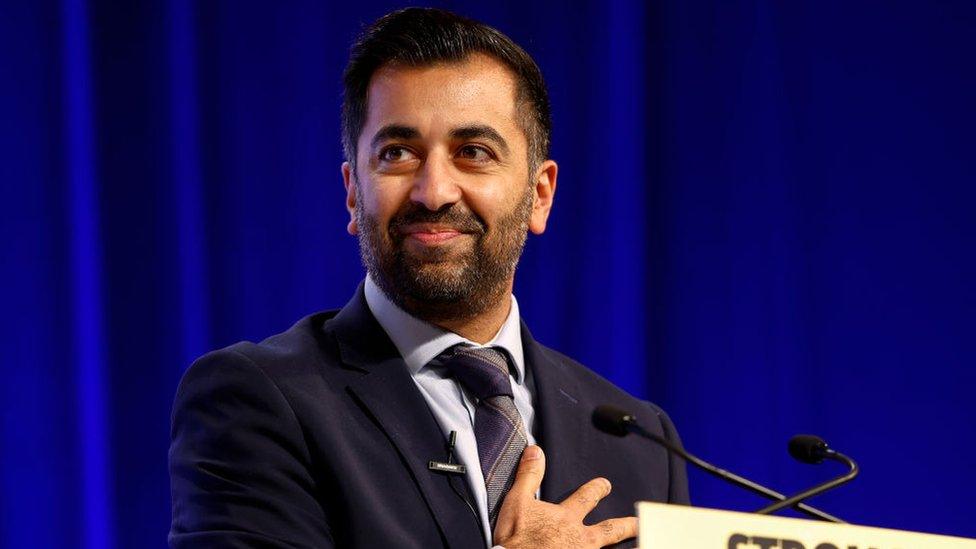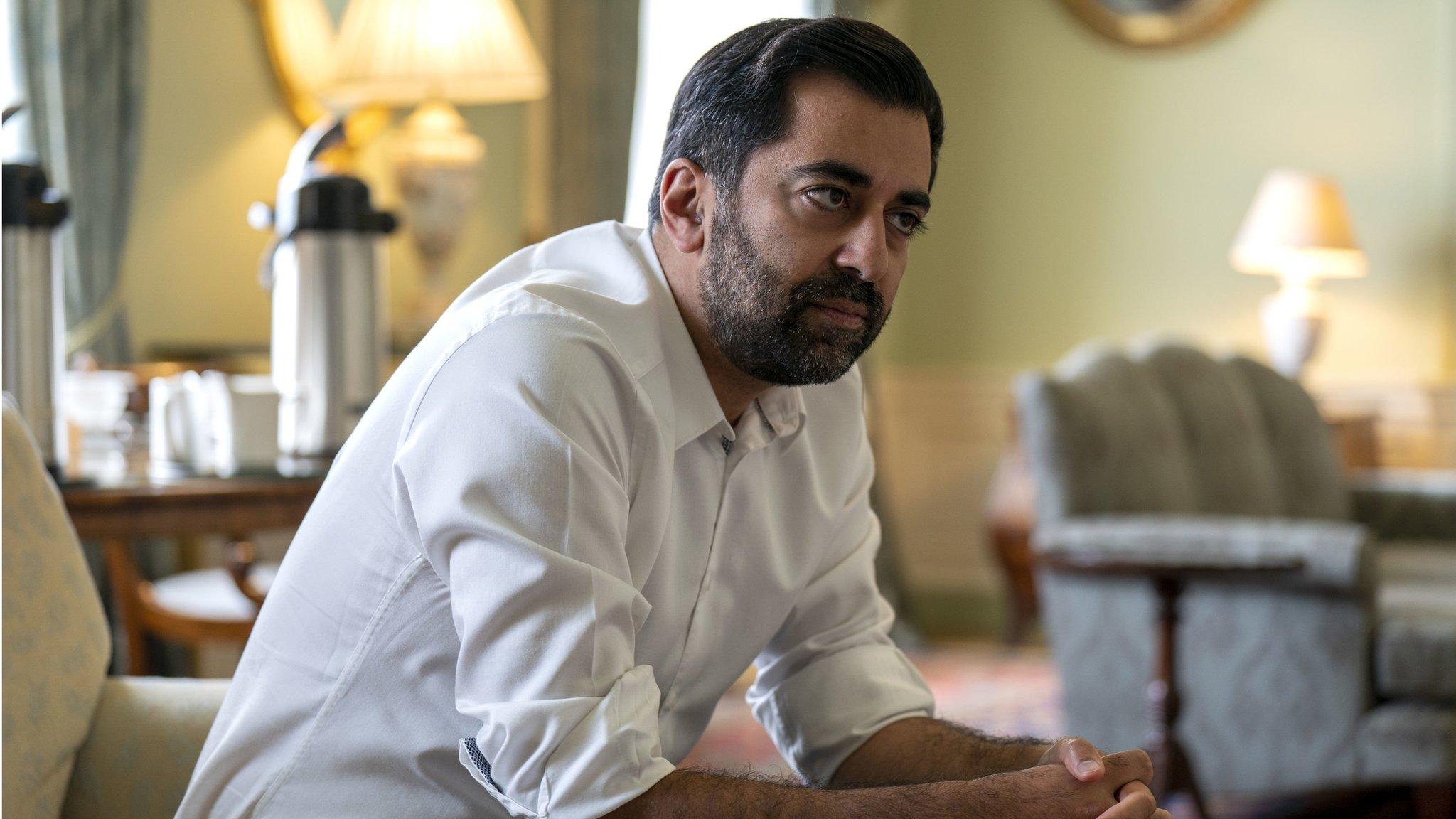SNP gets vertigo after years at political summit
- Published

The Scottish National Party has a case of political vertigo.
It has commanded the summits of Scottish politics for years, and been in power at Holyrood since 2007.
Since 2015, it has won the vast majority of Scotland's Westminster seats.
But so much around the SNP now seems to be spinning.
What was a sure-footed discipline, now replaced by squabbling among the party's MPs and MSPs. An ongoing police investigation into the party's finances - involving the arrest and release without charge of three senior figures, including former First Minister Nicola Sturgeon.
A calamitous by election loss to Labour. A defection to the Conservatives.
Privately, senior party figures accept political descent - going backwards - is all but inevitable.
The question is how deep the drop, and what that means for the SNP, the prospect of Scottish independence and who governs at Westminster.
In short, Scottish politics matters, wherever you're reading this.
"The genius of Alex Salmond and Nicola Sturgeon was to always keep independence, or an independence referendum, apparently on the horizon, if just out of reach," says one longstanding supporter of the party's two former first ministers.
The blunt truth, right now, is it no longer appears to be on the horizon.
The SNP has long argued it is an outrage that, despite there being majority support in the Scottish Parliament for another independence referendum, the government at Westminster has said no.
But whoever is prime minister over the next few years - Rishi Sunak or Keir Starmer - the answer looks like remaining a no.
"And what is the point of the SNP, if there is no obvious short-term path to a referendum?" asks a senior Labour figure.
Changing independence strategy
The SNP now say if they secure a majority of Scottish MPs at the next general election, they will say that would reaffirm their case that another referendum should happen.
But the answer from London isn't likely to shift, until it is politically impossible to deny Scotland another say.
"If 70% of people in Scotland wanted independence, and held that view for a decent amount of time, London would have to grant another referendum," says the same Labour voice.
Opinion polls suggest Scotland remains split down the middle.
And until and unless those opinion polls shift substantially, the SNP's bargaining power will be weakened if they lose seats at the election, even if they still have a majority of Scottish seats.
At the general election in 2019, the SNP won 48 of Scotland's 59 seats. They currently hold 43.
There will be 57 seats in Scotland at the next general election following a boundary review - meaning the SNP need to win 29 to hold a majority of them.
In other words, they could lose more than a dozen MPs and still manage that majority.
Third v. Fourth
Some within the SNP are keeping a keen eye on the Liberal Democrats.
There aren't many seats where the two parties are both competitive, but where they are in competition is: which party ends up being the third biggest at Westminster?
The Lib Dems will need to climb some way and the SNP fall some way for them to swap places, but recent electoral performance suggests both things might be possible.
And who comes third matters when it comes to two of the most vital things in politics: money and prominence.
The more seats and votes an opposition party win, the more so-called Short Money, external they get to support their operations.
And the leader of the third biggest party in the Commons - currently the SNP's Stephen Flynn - gets to ask questions every week at Prime Minister's Questions.
Other party spokespeople get lots of chances to contribute too.
It means the chances of them getting noticed is vastly higher than if you're the fourth biggest party.

This year's SNP conference saw activists adopt a new independence strategy
Could the party enter a doom loop of declining significance if they are beaten by the Liberal Democrats?
How would the most enthusiastic and impatient believers in independence in the SNP react if the party's power and influence wanes - even in the short term - and the prospect of another referendum looks years away?
Would there be an exodus to Alex Salmond's Alba Party?
And where would it leave support for independence? Does it start slipping back if the SNP go backwards?
In answer to those last two questions so far at least, shrinking support for the SNP in opinion polls has not been matched by a fall in support for independence.
So these are all big questions, without obvious, predictable, linear answers.
And, hang on a minute.
Some in the SNP point out their opinion poll ratings are still strong, party membership dwarfs every other party in Scotland and hope a message that suggests the Conservatives and Labour are very similar can resonate with many.
The first minister's conference speech was all about projecting a sense that the party is listening.
"We need to talk about what ordinary folk are talking about. That is the cost of living. We have to get our discipline back," says one senior figure.
"Lots of our activists want independence yesterday. But we need to take our time. It is about convincing the not-yet-convinced. And as far as the next election here in Scotland is concerned, there's still plenty to play for."
There certainly is.
Labour resurgence
The announcement about the freeze in council tax in Scotland was all about being seen to respond to the cost of living and that by-election loss.
But former first ministers and SNP leaders Mr Salmond and Ms Sturgeon never faced a Labour Party on the up, another SNP figure points out to me.
Humza Yousaf, the new-ish party leader, faces just that.
Labour now reckon they could be competitive in 25-30 seats in Scotland.
If they managed to win that many, it would make Keir Starmer's path to Downing Street clearer.
Let's see.
The SNP remain atop the summit of Scottish politics, a goliath compared to their rivals and the question of independence is a still crucial dividing line in Scotland.
Their opponents don't underestimate how big a job it will be to make a significant change to that.
But Labour do look like they are back in the game in Scotland.
And that matters, for the SNP, the question of independence, and who might end up in Downing Street.
Related topics
- Published16 October 2023

- Published15 October 2023
